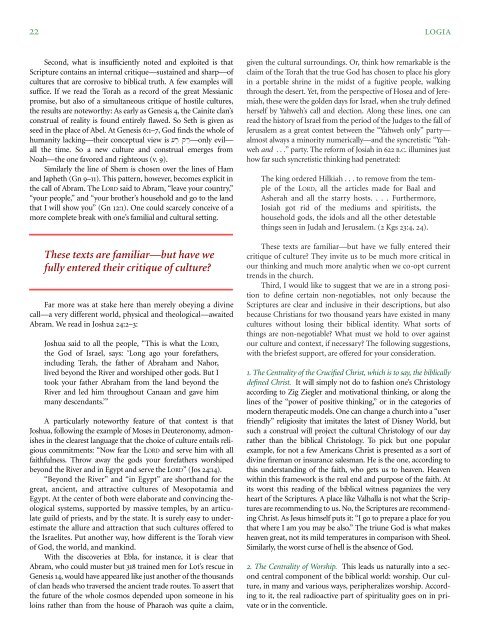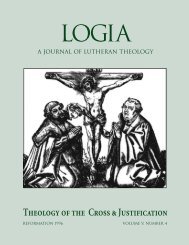04-2 Hermeneutics.pdf
04-2 Hermeneutics.pdf
04-2 Hermeneutics.pdf
- No tags were found...
Create successful ePaper yourself
Turn your PDF publications into a flip-book with our unique Google optimized e-Paper software.
22 LOGIASecond, what is insufficiently noted and exploited is thatScripture contains an internal critique—sustained and sharp—ofcultures that are corrosive to biblical truth. A few examples willsuffice. If we read the Torah as a record of the great Messianicpromise, but also of a simultaneous critique of hostile cultures,the results are noteworthy: As early as Genesis 4, the Cainite clan’sconstrual of reality is found entirely flawed. So Seth is given asseed in the place of Abel. At Genesis 6:1–7, God finds the whole ofhumanity lacking—their conceptual view is [ræ qræ—only evil—all the time. So a new culture and construal emerges fromNoah—the one favored and righteous (v. 9).Similarly the line of Shem is chosen over the lines of Hamand Japheth (Gn 9–11). This pattern, however, becomes explicit inthe call of Abram. The LORD said to Abram, “leave your country,”“your people,” and “your brother’s household and go to the landthat I will show you” (Gn 12:1). One could scarcely conceive of amore complete break with one’s familial and cultural setting.These texts are familiar—but have wefully entered their critique of culture?nbFar more was at stake here than merely obeying a divinecall—a very different world, physical and theological—awaitedAbram. We read in Joshua 24:2–3:Joshua said to all the people, “This is what the LORD,the God of Israel, says: ‘Long ago your forefathers,including Terah, the father of Abraham and Nahor,lived beyond the River and worshiped other gods. But Itook your father Abraham from the land beyond theRiver and led him throughout Canaan and gave himmany descendants.’”A particularly noteworthy feature of that context is thatJoshua, following the example of Moses in Deuteronomy, admonishesin the clearest language that the choice of culture entails religiouscommitments: “Now fear the LORD and serve him with allfaithfulness. Throw away the gods your forefathers worshipedbeyond the River and in Egypt and serve the LORD” (Jos 24:14).“Beyond the River” and “in Egypt” are shorthand for thegreat, ancient, and attractive cultures of Mesopotamia andEgypt. At the center of both were elaborate and convincing theologicalsystems, supported by massive temples, by an articulateguild of priests, and by the state. It is surely easy to underestimatethe allure and attraction that such cultures offered tothe Israelites. Put another way, how different is the Torah viewof God, the world, and mankind.With the discoveries at Ebla, for instance, it is clear thatAbram, who could muster but 318 trained men for Lot’s rescue inGenesis 14, would have appeared like just another of the thousandsof clan heads who traversed the ancient trade routes. To assert thatthe future of the whole cosmos depended upon someone in hisloins rather than from the house of Pharaoh was quite a claim,given the cultural surroundings. Or, think how remarkable is theclaim of the Torah that the true God has chosen to place his gloryin a portable shrine in the midst of a fugitive people, walkingthrough the desert. Yet, from the perspective of Hosea and of Jeremiah,these were the golden days for Israel, when she truly definedherself by Yahweh’s call and election. Along these lines, one canread the history of Israel from the period of the Judges to the fall ofJerusalem as a great contest between the “Yahweh only” party—almost always a minority numerically—and the syncretistic “Yahwehand . . .” party. The reform of Josiah in 622 B.C. illumines justhow far such syncretistic thinking had penetrated:The king ordered Hilkiah . . . to remove from the templeof the LORD, all the articles made for Baal andAsherah and all the starry hosts. . . . Furthermore,Josiah got rid of the mediums and spiritists, thehousehold gods, the idols and all the other detestablethings seen in Judah and Jerusalem. (2 Kgs 23:4, 24).These texts are familiar—but have we fully entered theircritique of culture? They invite us to be much more critical inour thinking and much more analytic when we co-opt currenttrends in the church.Third, I would like to suggest that we are in a strong positionto define certain non-negotiables, not only because theScriptures are clear and inclusive in their descriptions, but alsobecause Christians for two thousand years have existed in manycultures without losing their biblical identity. What sorts ofthings are non-negotiable? What must we hold to over againstour culture and context, if necessary? The following suggestions,with the briefest support, are offered for your consideration.1. The Centrality of the Crucified Christ, which is to say, the biblicallydefined Christ. It will simply not do to fashion one’s Christologyaccording to Zig Ziegler and motivational thinking, or along thelines of the “power of positive thinking,” or in the categories ofmodern therapeutic models. One can change a church into a “userfriendly” religiosity that imitates the latest of Disney World, butsuch a construal will project the cultural Christology of our dayrather than the biblical Christology. To pick but one popularexample, for not a few Americans Christ is presented as a sort ofdivine fireman or insurance salesman. He is the one, according tothis understanding of the faith, who gets us to heaven. Heavenwithin this framework is the real end and purpose of the faith. Atits worst this reading of the biblical witness paganizes the veryheart of the Scriptures. A place like Valhalla is not what the Scripturesare recommending to us. No, the Scriptures are recommendingChrist. As Jesus himself puts it: “I go to prepare a place for youthat where I am you may be also.” The triune God is what makesheaven great, not its mild temperatures in comparison with Sheol.Similarly, the worst curse of hell is the absence of God.2. The Centrality of Worship. This leads us naturally into a secondcentral component of the biblical world: worship. Our culture,in many and various ways, peripheralizes worship. Accordingto it, the real radioactive part of spirituality goes on in privateor in the conventicle.
















